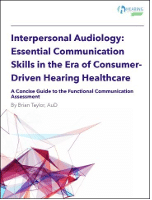HHTM Staff: Today’s post almost completes the Hansen’s disease/Leprosy series and the connection to sensorineural hearing loss. Last post tabulated data from all available studies, concluding that:
- vestibular disorders are uncommon or not related to Hansen’s disease
- hearing loss is related and under-reported, possibility to a large degree
- the hearing losses are sensorineural
- the hearing losses may be specifically neural in nature
- the hearing losses are independent of external ear and middle ear disorders long associated with leprosy
Causal Link?
El Arini et al (1970) comment that, rightly or wrongly, most cases of hearing loss observed with Hansen’s disease are “attributed to one of the numerous well-known causes of loss of hearing.” Their observation begs the question, already broached and partially surmised in the last post, of whether leprosy itself is the causal factor in reported hearing loss.
Hearing loss in the presence of Hansen’s disease may or may not be the result of the disease itself. Age, heredity, and ototoxicity are a few of the confounding variables that must be addressed before causal links can be established between hearing loss and leprosy. Studies described in this and the next post controlled for age, acknowledged the possibility of treatment effects, but exercised little control over other variables (e.g., noise exposure). Middle ear effects may have gone undetected or unreported in some studies.
Ototoxicity
Antibiotic ototoxicity stemming from MDT (multidrug therapy) treatment regimes does not seem to be an issue according to pharmacological reports of drug side effects or in clinical evaluations of leprosy subjects with hearing loss (Wani et al, 2009):
Evaluation of audiovestibular function was also carried out in 50 fresh cases of leprosy and after 3 months, 6 months and 1 year of multidrug therapy to ascertain any ototoxic side effects of antileprosy drugs. No audiovestibular dysfunction was detected in these patients at any time during follow-up.
Evidence for Bacilli-Caused Sensorineural Hearing Loss
In the most complete study available of hearing loss in patients diagnosed with Hansen’s disease, Rawlani et al (2013) performed audiometry and tuning fork testing on test subjects and normal controls. Subjects were 30 “in-door patients” who were undergoing MDT therapy and showed no evidence of external or middle ear problems, diabetes, high blood pressure, trauma history, or renal disorder. Controls were 30 age-matched healthy adults.
The study found that the incidence of hearing loss was significantly higher in test subjects than controls. Incidence was also was much higher than reported in previous studies. Most of the losses were bilateral and sensorineural. Degree of hearing loss varied from mild (43%) to moderate (43%) to moderately-severe (9%) or severe(4%).
Until proven otherwise, it seems wise to assume that sensorineural hearing loss can be caused by the leprosy bacilli in some cases. But what kind hearing loss? Sensory, neural, both?
Site of Lesion?
To the histopathologist, all leprosy is neural.
And to the bulk of Audiologists, all hearing losses without air-bone gaps are sensorineural. Purely neural, non-congenital hearing loss in the absence of eighth nerve tumor is a rare and therefore unexpected entity in clinic. Likewise, research is necessarily scanty.
No surprise, then, that assessments of auditory effects of Hansen’s disease are confusing when it comes to establishing site of lesion. Reports of “involvement of the acoustic nerve,” are counterbalanced by reports of “few case histories implicat[ing] 8th nerve involvement.” Reports by audiologists are lacking entirely.
Next post examines the scant and conflicting literature on putative origins of leprosy-caused sensorineural hearing losses: cochlear, peripheral and central.
References
El Arini, F et al. (1970): Eighth cranial nerve affection in leprosy. International Journal of leprosy, 38: 164.
Rawlani S et al. Evaluation of hearing impairment in leprosy patients taking multidrug therapy. Indian J Lepr, 2013; 85(4); 171-6.
Wani, A.A., et al. A clinical study of the cranial nerve involvement in leprosy. Egyptian Dermatology Online Journal, 2009; 5 (2): 3.
feature image courtesy of Cranial Nerves for SPL






